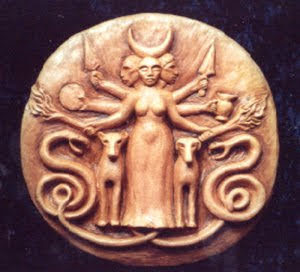Carmenta is a Roman goddess who is associated with childbirth.
Carmenta, like Antevorte and Postverta, is a Camenae goddess who governs over birth and prophesy.
- Her divination abilities are limited to the present, and she prophesies in poetry and song.
- She rules over poetry and pools of water, and her name means "magickal spell," "oracle," or "charm." Carmenta is a goddess of contraception who is summoned to prevent undesired births.
- Her devotion is believed to precede the foundation of Rome and is mainly devoted to women.
Ceres is a Roman goddess of agriculture.
Ceres, the goddess of grains, harvest, and maternity, is in charge of rich soil and the earth's nourishment.
- She taught mankind how to cultivate the land, as well as how to produce, preserve, and cook food.
- Ceres is a sympathetic and benevolent goddess who becomes involved in the daily lives of her devotees.
Ceres is the embodiment of a mother's devotion and commitment to her offspring, perhaps most remembered for her persistent pursuit of her abducted daughter Prosperpina.
- She is seen with a scepter and a basket of fruits and flowers in her hand.
- Demeter is her Greek equivalent.
Cerridwen is the goddess of the cauldron in Welsh mythology.
Cerridwen, the Keeper of the Sacred Cauldron, concocts heavenly knowledge and inspiration in her magical cauldron.
- She is the protector of spiritual development as well as the giver of wise counsel and ultimate justice.
- Cerridwen is primarily revered in the Crone aspect, creating the triad with Blodeuwedd and Arianrhod, despite the fact that she embodies the aspects of Maiden, Mother, and Crone.
Cerridwen, the goddess of the moon, is in charge of prophecy and witchcraft, as well as the powers of death and rebirth.
- She is said to be one of Avalon's five goddesses.
- Her totem animal is a white sow, and she has a holy year and a day for dedications and initiations.
Canola: Music and dancing goddess of Ireland.
The sound of the
wind whispering around the bones of a gutted beached whale lulled Canola to
sleep.
- She invented the Irish harp when she awoke, an instrument to recreate
the beautiful music she'd heard in her dreams.
- Canola, patroness of musicians
and bards, promotes creativity and inspiration.
Carna is the goddess of bodily well-being.
Carna guards humanity's life against spiritual assault and physical illness as the guardian of the human body and organs.
- She aids in the conversion of food into energy in the body and teaches appropriate health for survival.
- Carna, who is also the goddess of door hinges, connects the many realms and dimensions as well as opens and closes doors and gateways.
Candelifera is a Roman goddess
associated with childbirth.
Candelifera is the Candle Bearer, assisting
children in their transition from the womb to the outside world.
- A candle is
lighted during labor and delivery to ask for her help and protection.
Cailleach: Scotland's Hag Goddess.
Cailleach, the heavenly hag of Scottish Gaelic mythology, is the maker of mountains, hills, and valleys.
- Cailleach, a landscape and wilderness builder, wields a hammer or staff that freezes the ground during the winter months.
- She is the embodiment of winter, imprisoning spring and governing the period between the end of the harvest and the start of spring.
The advent of Brigid and the holy flames of Imbolc bring an end to her rule.
- She is revered by hunters seeking for fresh meat during the dark months of the year because she protects wolves and deer.
- She is the source of nightmares, terrors, and, ultimately, death.
- Cailleach is depicted as a blue-faced crone, so close to death that her face resembles a skeleton.
- She was a renowned magician, healer, and midwife.
Caipora is a Brazilian animal
goddess.
In her native South America, Caipora is known as the Lady of Beasts.
- She protects animals from human hunters by living in the forests and jungles.


















































